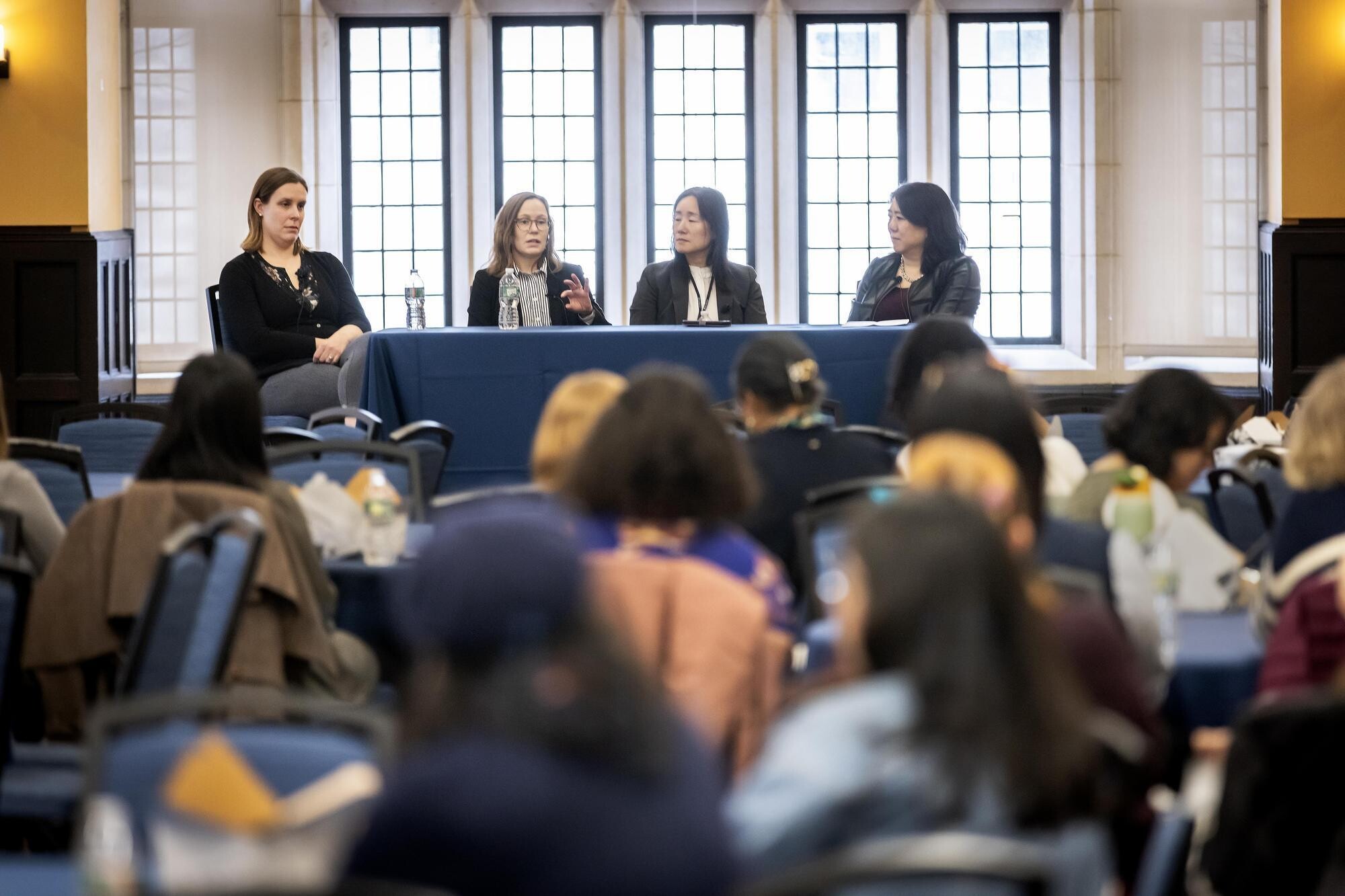
(From left) Doctoral student Hannah Yamagata, research assistant professor Kushol Gupta, and postdoctoral fellow Marshall Padilla holding 3D-printed models of nanoparticles.
(Image: Bella Ciervo)
3 min. read

Whether it’s about the importance of forming connections and finding mentors, resilience in the face of failure, or strategies for work-life balance, University of Pennsylvania scientists have a lot of wisdom to offer, many insights gleaned from advancing through graduate school and their careers.
Students recently had the opportunity to learn from the experiences of four women in STEM at Penn: Vanessa Chan, the inaugural vice dean of innovation and entrepreneurship in the School of Engineering and Applied Science; Allyson Mackey, associate professor of psychology in the School of Arts & Sciences; Ping Wang, professor of pathology and laboratory medicine at the Perelman School of Medicine; and Melissa Kelly, deputy managing director at the Penn Center for Innovation.
Chan moderated the discussion as part of the annual Women in STEM Symposium, hosted by the Weingarten Center and Office of Equal Opportunity Programs. The theme this year was Pathways for Women in STEM: Exploring Innovation, Commercialization, and Entrepreneurship, and the event also included a poster fair from undergraduate and master’s women in STEM.
The four speakers took very different pathways to Penn. Chan spent 13 years at McKinsey & Company and later served as chief commercialization officer for the U.S. Department of Energy in the Biden Administration. Kelly transitioned from pre-med to research to tech commercialization.
Mackey thought about becoming an ecologist before growing curious about how environments shape human behavior, and she has since been driven by her passion for education and helping kids learn. Wang shifted from basic research to clinical chemistry but found she still had a passion for research.
They recounted failures and setbacks in their careers, but Chan reflected, “When the really bad stuff happens, it’s actually an opportunity for growth and a pivot, or to rethink where you might want to go.”
Wang had previously commented, “Even if you want to pivot into a different field, I don’t think the trainings and connections you have built during the process will be wasted.” This led Chan to ask a question with which both students and professionals may struggle: “How do you actually get a mentor?”
“I am extremely bad at this. I hate asking for help,” Mackey replied. But she was required to have an undergraduate advisor and had fellowships that included formal mentorship, “and the people have been invaluable, so I’m grateful for the structures that force mentors on people who don’t know how to ask for help,” she said.
Chan and Wang agreed that women often worry about bothering people. But Kelly encouraged attendees, “You may think that somebody has a million other things they could be doing other than helping you, and that may not be the case, or it might be, but what’s the worst they could say? ‘No,’ right? At least you’re asking the question.”
They also talked about relationships outside of academia and approaches to work-life balance. With two kids, Mackey said as she plans each week, she thinks about how long something will take but then doubles that time and also adds space. Stressing the importance of having an equal partner, Chan said one of the most important decisions she made in order to be a working mom was who she married.
What keeps the four of them going is passion for what they do, and they encouraged students to think beyond their GPA.
“The grades can only get you so far. They get you through the door. But once you are through the door, then the most important thing is to think about ways to find your passion,” Wang said, because that’s how you can recover quickly from failure. Kelly added, “The most important currency in life is time … Find what you love and dedicate your time to doing that thing.”

(From left) Doctoral student Hannah Yamagata, research assistant professor Kushol Gupta, and postdoctoral fellow Marshall Padilla holding 3D-printed models of nanoparticles.
(Image: Bella Ciervo)

Jin Liu, Penn’s newest economics faculty member, specializes in international trade.
nocred

nocred

nocred